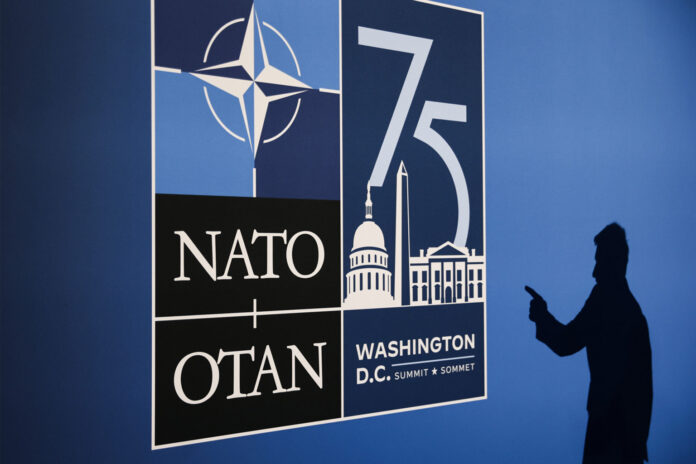At the NATO Summit, celebrating 75 years of the military alliance in Washington DC, alliance leaders have formally declared that Ukraine is on an “irreversible path” to membership and pledged to provide Kyiv with at least $43 billion in military aid within the next year.
The pledges, which were part of the final NATO communique following the summit on Wednesday, come as the military alliance’s members announced individual and joint steps to boost Ukraine’s and Europe’s security. This includes the United States, Netherlands and Denmark announcing that the first NATO-provided F-16 fighter jets would be in the hands of Ukrainian military pilots by this summer. The US also said it will be deploying longer-range missiles in Germany in 2026, a major step aimed at countering what the allies say is Russia’s growing threat to Europe. This move would have been banned under the Intermediate-Range Nuclear Forces Treaty signed by the US and the Soviet Union in 1987, but the treaty collapsed in 2019.
Suffice to say, since the end of the cold war, the most deadly US weapons are now going to be positioned in the European continent.
Meanwhile Ukrainian President Volodymyr Zelenskyy posted on social media platform X his appreciation of NATO’s effort to strengthen Ukraine’s air force, saying the new fighter jets “bring just and lasting peace closer, demonstrating that terror must fail”.
‘Ukraine’s future is in NATO’
The NATO Summit has committed to almost all of President Zelenskyy’s demands, as the alliance in addition to the F-16s, has promised to provide Ukraine with dozens of air defence systems. In particular, the US has agreed to provide Ukraine with four Patriot missile systems, while other members are providing the upkeep and maintenance of these systems.
The alliance’s communique, declaring “Ukraine’s future is in NATO”, promised to continue to support Kyiv “on its irreversible path to full Euro-Atlantic integration, including NATO membership”. But the invitation would come “when Allies agree and conditions are met”, it said.
The US and some other countries have opposed membership for Ukraine during the conflict with Russia to avoid an escalation of tensions that could lead to a larger war. They also have stressed that Ukraine must take significant steps to address corruption as well as other systemic reforms.
NATO Secretary-General Jens Stoltenberg underlined that Ukraine will not join the alliance’s ranks immediately, but insisted that must happen after the war is over to ensure that Russia never attacks Kyiv again.
The NATO communique also strengthened past language on China, calling it a “decisive enabler” of Russia’s war effort in Ukraine and saying Beijing continues to pose systemic challenges to Euro-Atlantic security.
Stoltenberg told reporters it was the first time the 32 allies had jointly labelled China a decisive enabler of Russia’s war and called it an important message. He said NATO was not an organisation that imposes sanctions but added: “At the end of the day, this will be for individual allies to make decisions, but I think the message we send from NATO from this summit is very clear.”
NATO and the Indo-Pacific
In a significant development, the leaders of the pacific nations of Australia, Japan, New Zealand and South Korea were in attendance during the NATO Summit, leading to speculation about NATO’s expansion into the Indo-Pacific maritime geography.
With an eye on China, the US is increasingly bringing its Indo-Pacific partners under Washington’s leadership and forging closer relations between them and the NATO. The alliance is strengthening dialogue and cooperation with the 4 countries.
In a world in flux, the Indo-Pacific geography is increasingly important for the Alliance, given that developments in that region can directly affect Euro-Atlantic security and the rules-based international order.
(With agency inputs)










